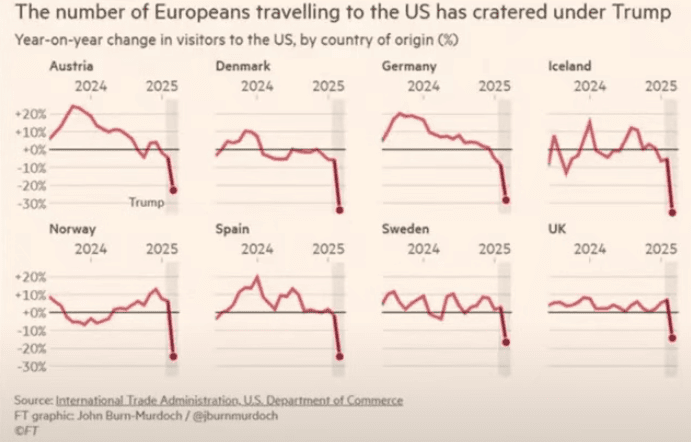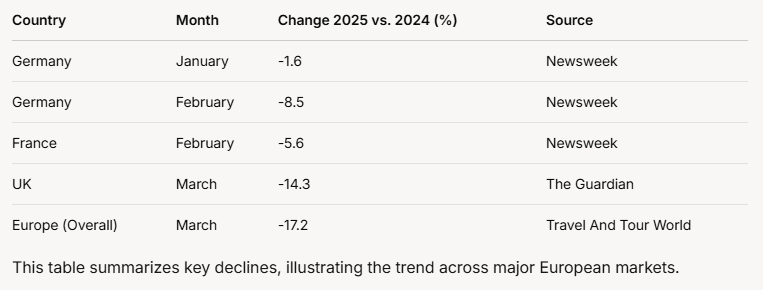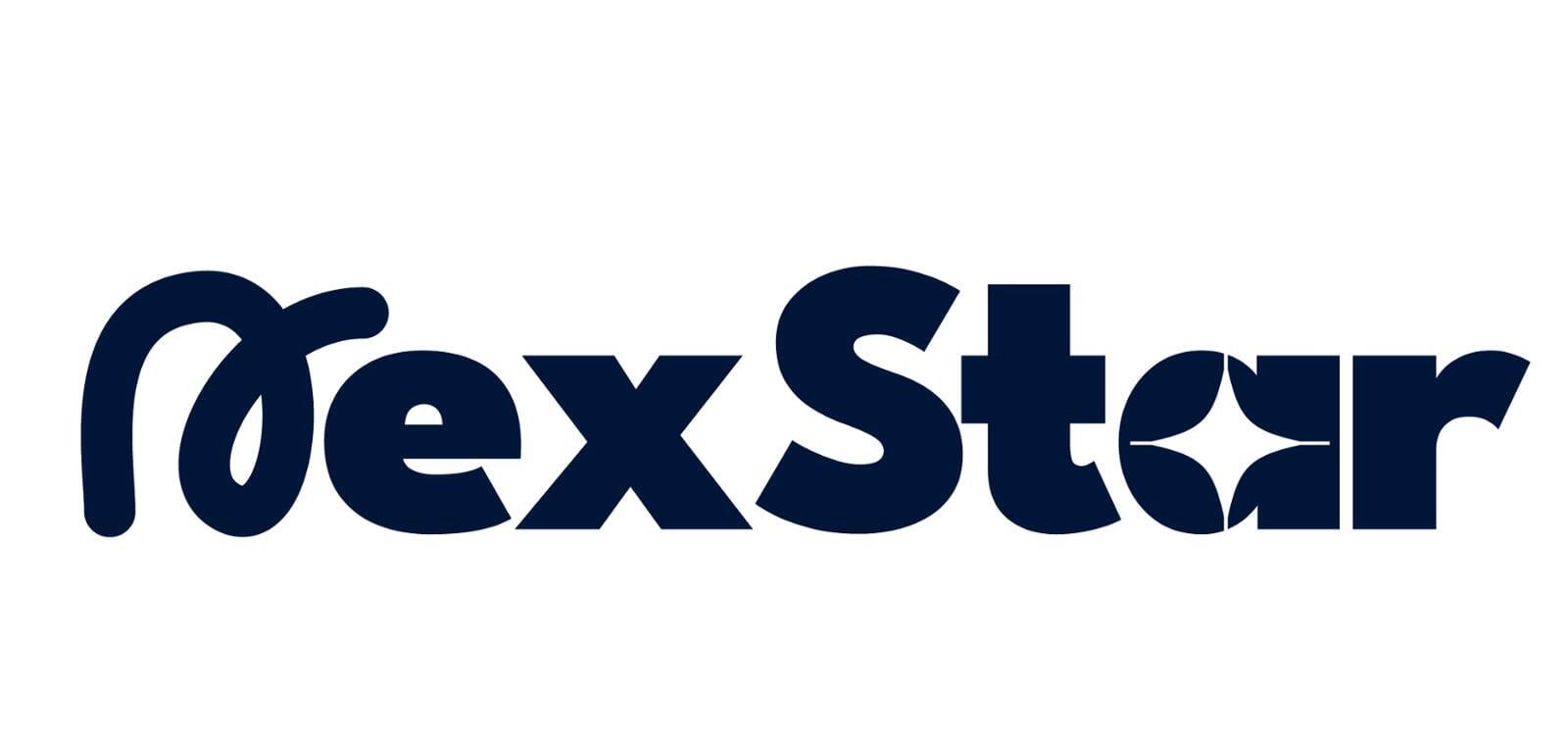In the current global economic and political landscape, the tourism sector is experiencing significant shifts, particularly with a notable decline in European visitors to the United States in 2025. This analysis, grounded in recent data and trends, explores the extent of this decline, its causes, and the opportunities it presents for businesses, especially for high-level entrepreneurs looking to adapt and thrive.

Context and Data Overview
Research suggests a substantial decrease in European tourism to the U.S., with specific figures highlighting the severity. According to a report from Travel And Tour World published on April 8, 2025, U.S. tourism from Europe dropped by 17.2% in March 2025 compared to the same month in 2024, amid rising geopolitical tensions (U.S. Tourism Declines, Visits To Europe Drop in March: Why You Need To Know). This decline is part of a broader trend, with The Guardian reporting a 14.3% drop in UK residents visiting the U.S. in March 2025 compared to 2024, driven by concerns over Trump’s policies and rhetoric (‘I’m super worried’: fewer UK tourists visiting US amid Trump’s policies and rhetoric | Travel | The Guardian).
Further, Newsweek detailed specific declines, noting a -1.6% difference for German visitors in January 2025 compared to January 2024, escalating to -8.5% in February, and a -5.6% drop for French visitors in February 2025 compared to the previous year (Chart Shows US Tourism Drop Amid Wave of Travel Warnings from Europe - Newsweek). These figures align with broader projections from Tourism Economics, which, as reported by TIME on April 1, 2025, expects a 9.4% decline in total international arrivals to the U.S. in 2025, a sharp reversal from earlier predictions of growth (Tourism to U.S. Expected to Drop Amid Trump Policies and Rhetoric | TIME).

Causes of the Decline
The evidence leans toward the decline being linked to the policies and rhetoric of the Trump administration, re-elected in 2024 and serving from January 2025. CNN reported on April 9, 2025, that European travelers are canceling or rethinking U.S. trips due to hostile anti-European rhetoric and tariff wars, with Virgin Atlantic noting slowed demand for transatlantic travel (‘It’s like our friend started a fist fight with us’: These Europeans are skipping US travel | CNN). TIME further detailed that high-profile border detentions and Trump’s stance on tariffs and international relations have chilled traveler sentiment, with Tourism Economics President Adam Sacks highlighting “unforced error after unforced error” impacting travel (Tourism to U.S. Expected to Drop Amid Trump Policies and Rhetoric | TIME).
Additionally, Skift on April 8, 2025, analyzed flight searches showing a 0.4% year-over-year decline in travel intent from 27 EU countries to the U.S., with Germany and Italy each recording declines nearing 1 percentage point, indicating growing uncertainty (Visitors to U.S. From Top Markets Down 10% - Skift). This sensitivity to geopolitical developments, as noted by Carlos Cendra of Mabrian, underscores the impact of policy on travel decisions.
Business Implications and Opportunities
For businesses, especially those in tourism and related sectors, this decline presents both challenges and opportunities. The Conversation article from March 29, 2025, estimates an $18 billion dip in U.S. tourism revenues, affecting airlines, hotels, and national parks, with states like New York, Michigan, California, Nevada, and Florida feeling the pinch (Tourists are cancelling trips to the US – here’s how this could affect its economy - The Conversation). However, this shift opens doors for alternative destinations, particularly Mexico, which is gaining traction.
Mexico, with 42 UNESCO biosphere reserves and safe regions like Yucatán and Campeche, aligns with European preferences for sustainable and secure travel, as noted in Ecotourism in Mexico - Wikipedia. Reports from Frommers highlight these areas as safe, similar to European destinations, appealing to travelers seeking cultural and natural experiences (Frommers | These Are the Safest Parts of Mexico for Travel in 2025).
For high-level entrepreneurs, adapting to this shift involves leveraging digital tools and strategic consulting. GoZen.io, for instance, offers solutions like GoZen Forms for lead capture and GoZen Growth for personalized email campaigns, increasing conversions by up to three times, according to their data. This is crucial for creating targeted campaigns to attract European travelers to alternative destinations.
NexStar Consulting, with its Nautilus Method, provides a framework for incremental digital transformation, integrating AI and automation to optimize operations. This approach, detailed on their website, connects technology with human purpose, aligning with the values of sustainability and authenticity sought by European markets (NexStar Consulting Website). For example, automating booking systems or personalizing customer experiences can help businesses adapt swiftly to changing market dynamics.
Strategic Recommendations for Entrepreneurs
Given these trends, entrepreneurs, especially those in tourism, should consider the following:
- Diversify Markets: Explore opportunities in regions like Mexico, where demand is rising, as evidenced by increased bookings in alternative destinations reported by EL PAÍS on April 10, 2025 (Spain’s tourism sector anticipates 5.2% growth in Q2 2025 - EL PAÍS).
- Leverage Digital Tools: Use platforms like GoZen.io to create engaging, cost-effective campaigns that resonate with European travelers’ preferences for safety and sustainability.
- Seek Expert Guidance: Partner with consultants like NexStar Consulting to implement a long-term strategy, ensuring resilience and growth in a volatile market.
Conclusion and Call to Action
The decline in European visitors to the U.S. in 2025, driven by geopolitical tensions, is a complex issue with significant implications for global businesses. For high-level entrepreneurs, it’s an opportunity to innovate and adapt, leveraging tools and strategies to capture emerging markets. Visit NexStar Consulting to explore how we can support your business in navigating this landscape with our Nautilus Method, ensuring sustainable growth and leadership in a changing world.
Key Citations
- U.S. Tourism Declines, Visits To Europe Drop in March: Why You Need To Know
- ‘I’m super worried’: fewer UK tourists visiting US amid Trump’s policies and rhetoric | Travel | The Guardian
- Chart Shows US Tourism Drop Amid Wave of Travel Warnings from Europe - Newsweek
- ‘It’s like our friend started a fist fight with us’: These Europeans are skipping US travel | CNN
- Tourism to U.S. Expected to Drop Amid Trump Policies and Rhetoric | TIME
- Visitors to U.S. From Top Markets Down 10% - Skift
- Tourists are cancelling trips to the US – here’s how this could affect its economy - The Conversation
- Ecotourism in Mexico - Wikipedia
- Frommers | These Are the Safest Parts of Mexico for Travel in 2025
- Spain’s tourism sector anticipates 5.2% growth in Q2 2025 - EL PAÍS
- NexStar Consulting Website
